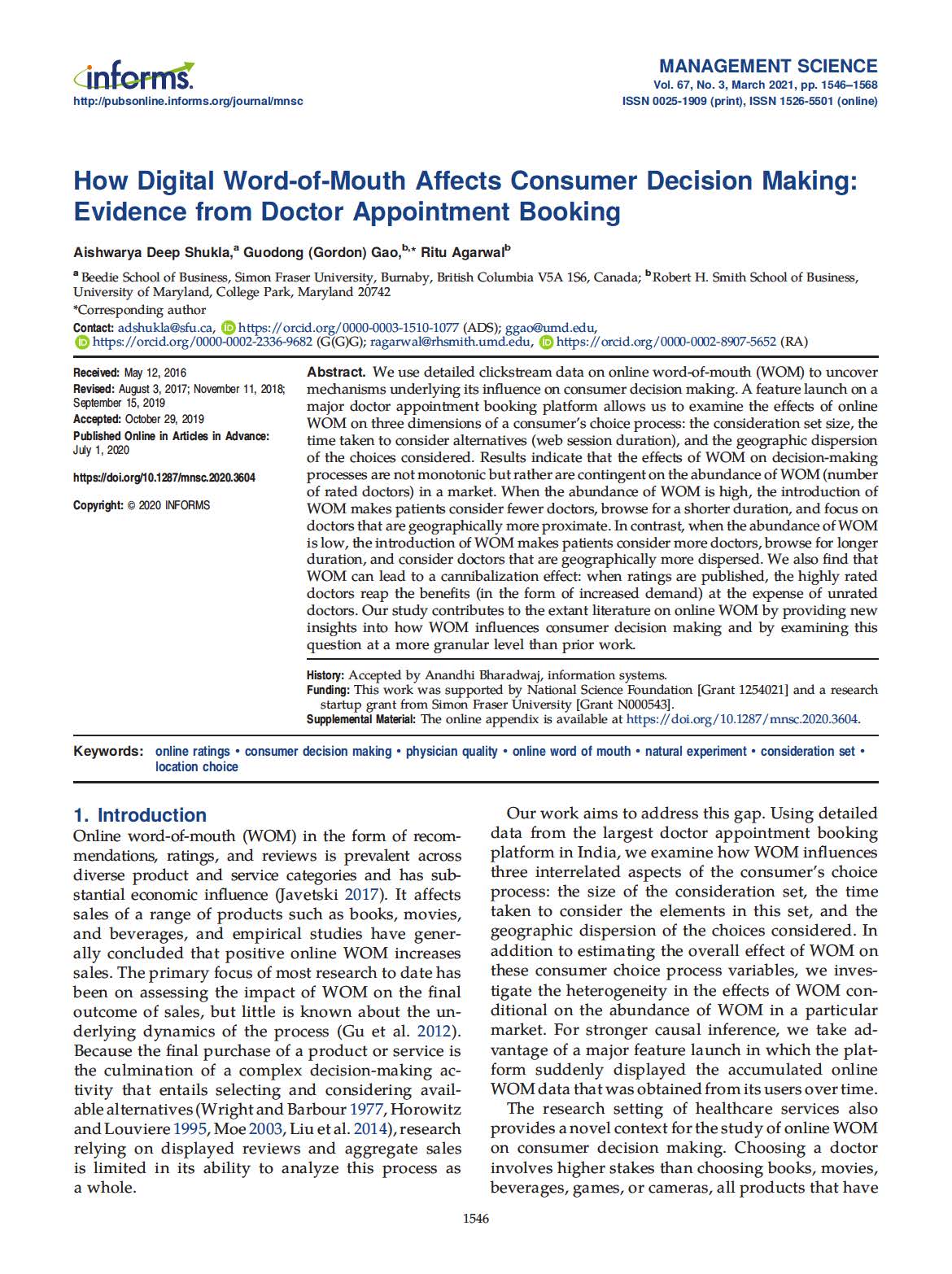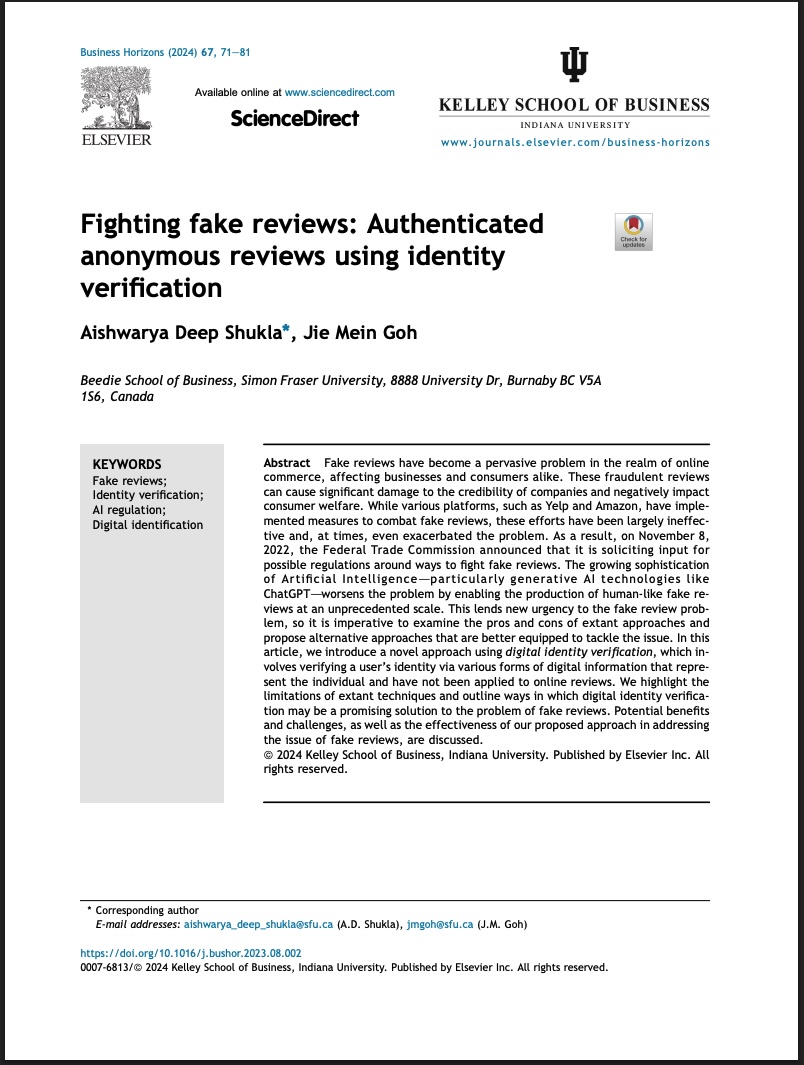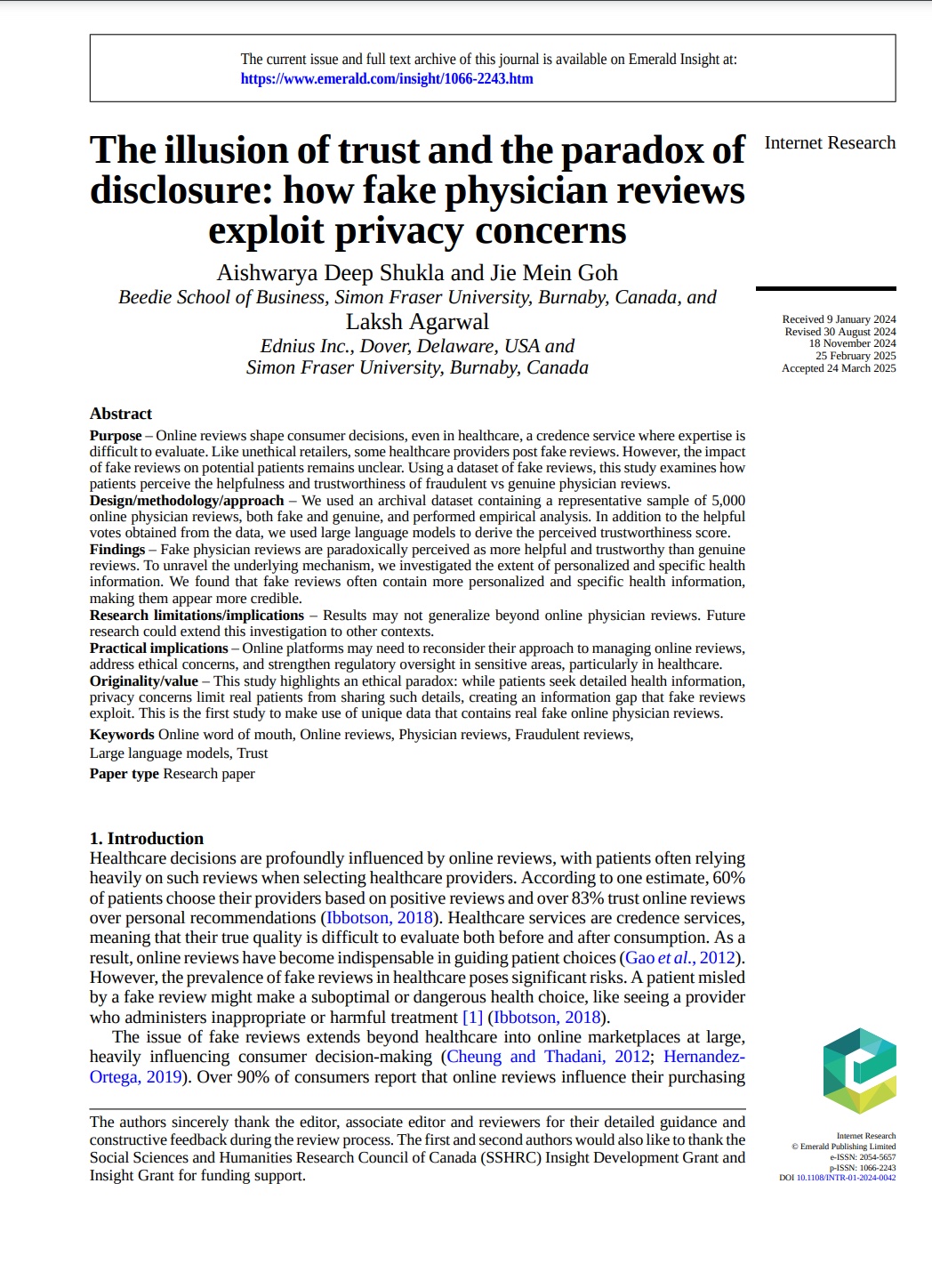Research
Research Themes
My research program investigates crucial areas within Information Systems, focusing on:
- Digital Word-of-Mouth & Platforms: Analyzing the role of online reviews, ratings, and other user-generated content on consumer trust, decision-making, and market dynamics, with a specific focus on sensitive contexts like online healthcare platforms. I explore how consumers utilize and trust this information and how platforms can optimize its presentation.
- Artificial Intelligence & Digital Trust: Exploring how AI, including Large Language Models, impacts online information authenticity, the detection of manipulation (like fake reviews), and the broader implications for trust and integrity on digital platforms.
- Healthcare Information Technology: Studying the design, adoption, and effectiveness of IT systems in healthcare settings, examining how user interface design and technology adoption influence patient engagement and health outcomes.
Ultimately, my research aims to contribute to a deeper understanding of the digital world and inform the creation of more trustworthy and effective online interactions.
Methodological Approach
To empirically investigate these themes, I utilize a range of advanced methodologies:
- Large-scale Econometric Analysis: Applying statistical models to large datasets (often scraped or obtained from platforms) to analyze user behavior, estimate causal effects, and identify significant drivers of outcomes in online settings.
- Field Experiments: Conducting controlled experiments in real-world online environments to test specific interventions, platform features, or informational treatments and measure their causal impact on user behavior.
- Text Analysis & Machine Learning: Applying computational methods, including natural language processing and machine learning models (like LLMs), to process, analyze, and extract meaningful insights from unstructured textual data (e.g., millions of online reviews).
This combination of observational data analysis, causal inference through experiments, and computational text analysis allows for a comprehensive investigation of digital phenomena.
Publications
Published Papers
-
Shukla AD, Gao G, Agarwal R (2021), "How Digital Word-of-Mouth Affects Consumer Decision Making: Evidence from Doctor Appointment Booking," Management Science, 67(3), 1546-1568.
Doi:10.1287/mnsc.2020.3604We use detailed clickstream data on online word-of-mouth (WOM) to uncover mechanisms underlying its influence on consumer decision making. A feature launch on a major doctor appointment booking platform allows us to examine the effects of online WOM on three dimensions of a consumer's choice process: the consideration set size, the time taken to consider alternatives (web session duration), and the geographic dispersion of the choices considered. Results indicate that the effects of WOM on decision-making processes are not monotonic but rather are contingent on the abundance of WOM (number of rated doctors) in a market. When the abundance of WOM is high, the introduction of WOM makes patients consider fewer doctors, browse for a shorter duration, and focus on doctors that are geographically more proximate. In contrast, when the abundance of WOM is low, the introduction of WOM makes patients consider more doctors, browse for longer duration, and consider doctors that are geographically more dispersed. We also find that WOM can lead to a cannibalization effect: when ratings are published, the highly rated doctors reap the benefits (in the form of increased demand) at the expense of unrated doctors. Our study contributes to the extant literature on online WOM by providing new insights into how WOM influences consumer decision making and by examining this question at a more granular level than prior work. -
Shukla, AD, & Goh, JM (2023). Fighting fake reviews: Authenticated anonymous reviews using identity verification. Business Horizons.
Link: http://doi.org/10.1016/j.bushor.2023.08.002Fake reviews have become a pervasive problem in the realm of online commerce, affecting businesses and consumers alike. These fraudulent reviews can cause significant damage to the credibility of companies and negatively impact consumer welfare. While various platforms, such as Yelp and Amazon, have implemented measures to combat fake reviews, these efforts have been largely ineffective and, at times, even exacerbated the problem. As a result, on November 8, 2022, the Federal Trade Commission announced that it is soliciting input for possible regulations around ways to fight fake reviews. The growing sophistication of Artificial Intelligence-particularly generative AI technologies like ChatGPT-worsens the problem by enabling the production of human-like fake reviews at an unprecedented scale. This lends new urgency to the fake review problem, so it is imperative to examine the pros and cons of extant approaches and propose alternative approaches that are better equipped to tackle the issue. In this article, we introduce a novel approach using digital identity verification, which involves verifying a user's identity via various forms of digital information that represent the individual and have not been applied to online reviews. We highlight the limitations of extant techniques and outline ways in which digital identity verification may be a promising solution to the problem of fake reviews. Potential benefits and challenges, as well as the effectiveness of our proposed approach in addressing the issue of fake reviews, are discussed. -
Shukla, A.D., Goh, J.M. and Agarwal, L. (2025), "The illusion of trust and the paradox of disclosure: how fake physician reviews exploit privacy concerns", Internet Research, Vol. ahead-of-print No. ahead-of-print.
Link: https://doi.org/10.1108/INTR-01-2024-0042Online reviews play a pivotal role in guiding consumers' choices, even for credence services like healthcare. Just as unethical retailers sometimes manipulate reviews and post fake reviews, so do unethical healthcare providers. However, the influence of these fake reviews on consumers or potential patients remains unknown. Using a novel data set containing fake reviews, we investigate how potential patients perceive the helpfulness and trustworthiness of fraudulent physician reviews as compared to genuine ones. We establish that fake physician reviews are not only perceived by patients as more helpful than genuine reviews, but they are also ironically seen as more trustworthy. To uncover the underlying mechanisms and understand the characteristics that make fake reviews seem more trustworthy, we employ advanced natural language processing making use of GPT-4. Our analysis reveals that fake reviews often contain a higher degree of personalized and specific health information, making them appear more credible and helpful. This presents an ethical paradox: The demand for detailed health information in reviews is high, but due to real patients' privacy concerns, the supply of such information is low, thereby creating an information gap. Fake reviews opportunistically fill this gap, exploiting the trust of unsuspecting potential patients. We provide actionable insights for platforms and illustrate effective ways to manage the adverse impact of fake online physician reviews.
Forthcoming Research
-
Shukla AD, Goh JM, Sun T, Gao G, Agarwal R, "Effect of Warm Glow Nudge and Privacy Control on Online Physician Reviews: Evidence from a Field Experiment", Forthcoming at Journal of Management of Information Systems.
Patients using healthcare services have substantial privacy concerns when writing online reviews of their physicians that may deter them from sharing information potentially helpful for others. This gives rise to a dilemma in which patients have to trade off between privacy and social welfare, leading to fewer and less informative reviews. To examine this trade off, we study how nudging strategies and privacy control affect reviewers' decisions related to the contribution of reviews, disclosure of sensitive information, and identity revelation. We use a large-scale two-stage field experiment, complemented by lab experiments, to establish causality. Results reveal that nudging with an open appeal, compared to nudging with targeted benefits, increases the likelihood of patients submitting reviews. However, nudges that highlight benefits to self increase the proportion of patients revealing sensitive medical information in their reviews and the likelihood of them revealing their identity. Additionally, preemptive privacy control increases the likelihood of identity revelation without adversely impacting the sharing of sensitive information in reviews. Our findings highlight how nudging and privacy control influence patients' review provision behavior. This study offers strategic implications for online platforms navigating the complex interplay of consumer motivations and privacy concerns in healthcare.
Conference Presentations
- Shukla AD, Goh JM, Sun T, Gao G, Agarwal R (2023) "Effect of Warm Glow Nudge and Privacy Control on Online Physician Reviews: Evidence from a Field Experiment", Conference on Health Information Technology and Analytics, Washington DC, USA.
- Shukla AD, Goh JM, Saraf N (2022) "Effect of Questions and Answers on Online Reviews: Evidence from Amazon.com", Statistical Challenges in Electronic Commerce Research 2022, Madrid, Spain.
- Shukla AD, Sun T, Gao G, Agarwal R (2019) "Speech is Silver, Silence is Golden-Motivational Framing Backfires: Evidence from a Field Experiment", INFORMS Annual Meeting, Seattle, USA.
- Shukla AD, Wang W, Gao G, Agarwal R (2018) "Catch me if you can: Fraudulent Online Reviews in Healthcare," Workshop on Information Systems and Economics (WISE), San Francisco, USA.
- Dugas M, Shukla AD, Gao G, Agarwal R (2017) "Gender Inequalities in Online Doctor Ratings," INFORMS Annual Meeting, Philadelphia, USA.
- Shukla AD, Wang W, Gao G, Agarwal R (2016) "Using Machine Learning to Detect Fraudulent Reviews," Workshop on Health IT and Economics (WHITE), Washington D.C., USA.
- Shukla AD, Gao G, Agarwal R (2015) "The Effects of Online Word of Mouth on Physician Demand: Evidence from a Natural Experiment," INFORMS Annual Meeting, Philadelphia, USA.
- Shukla AD, Gao G, Agarwal R (2015) "Digital Word-of-Mouth and Consumer Demand for Credence Services: Evidence from a Natural Experiment," INFORMS Healthcare, Nashville, USA.
- Shukla AD, Gao G, Agarwal R (2014) "Digital Word-of-Mouth and Consumer Demand for Credence Services: Evidence from a Natural Experiment," Workshop on Information Systems and Economics (WISE), Auckland, New Zealand.
- Shukla AD, Gao G, Agarwal R (2014) "Would You See a Doctor Just Because Anonymous Patients Vouch for Him? A Longitudinal Study on Effect of Online Patient Recommendations on Doctor's Appointments," Workshop on Health IT and Economics (WHITE), Washington D.C.
Grants
Successful funding applications supporting my research initiatives:
- SSHRC Insight Development Grant (2022-2024) $69,000
- SFU Beedie School of Business Dean's Grant (2019-2024) $20,000
- SFU Startup Research Grant (2018-2021) $40,000
- SFU Teaching and Learning Development Grant (2019-2022) $6,000
- SFU SSHRC Insight Internal Grant (2021-2022) $6,918
- University of Maryland Center for International Business Research Grant (2016) USD 4,000
- University of Maryland Dean's Fellowship (2014-2017) USD 32,000
Student Supervision
I am committed to mentoring the next generation of researchers and analysts. I supervise students on research projects, helping them develop essential skills in research design, data analysis, and critical evaluation within the field of Information Systems.
PhD Student
- Parto Tavassoli (Aug 2022 - Present) - Research focus includes topics related to Artificial Intelligence in digital platforms.
Undergraduate Research Assistants
Working closely with talented undergraduates on focused research tasks and projects:
- Danishbir Singh (Sep 2023 - Dec 2023)
- Matthio Lim (March 2023 - Aug 2023)
- Ina Wong (Feb 2023 - Aug 2023)
- Laksh Agarwal (Sep 2021 – Present)
- Jared Chiu (Aug 2021 - Feb 2022)
- Himani Boury (Apr 2021 – Sep 2021)
- Cassidy Lee Emby (Apr 2021 – Aug 2021)
- Zaid Rauf (Apr 2019 – May 2019)
- Daniel Breedveld (Apr 2019 – May 2019)
- Raveen Saroya (Apr 2019 – May 2019)
- Annie Zhou (Jan 2019 – Aug 2019)
- Eric Wong (Oct 2018 - Apr 2019)
- Laura Cao (Oct 2018 – Nov 2018)
- Raymond Zheng (Oct 2018 - Nov 2018)
Work Study Students
Providing opportunities for students to gain practical experience in research support roles:
- Matthew Myckland (Fall 2023)
- Michael Alegbeleye (Fall 2023)
- Guanhua Lao (Fall 2023, Spring 2024)
- Ha Thu Ngyugen (Fall 2023)
- Enwongobasi Ekanem (Spring 2022)
- Tarunjeev Juneja (Spring 2022)
- Azwad Fardeen (Spring 2022)
- Giulia Crovini (Spring 2022)
- Anshal Chopra (Spring 2022)
- Abhishek Banka (Spring 2022)
- Salehin Haque (Fall 2021, Spring 2022)
- Mannat Kang (Fall 2021)
- Kapil Shrestha (Fall 2021)
- Huyen Pham (Summer 2021)
- Lakshay Sethi (Summer 2021)
- Rubab Singh (Summer 2021)
- Uddhav Solanki (Summer 2021)


